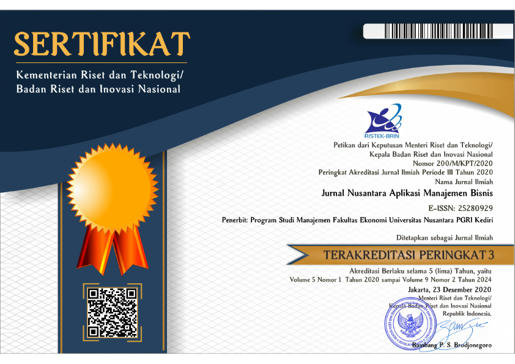Peran Keterlibatan Pegawai Dalam Pengaruh Kenyamanan Lingkungan Kerja, Komunikasi Dan Manajemen Waktu Terhadap Kinerja Pegawai Di Lingkungan Pemerintah Provinsi Kepulauan Riau
DOI:
https://doi.org/10.29407/nusamba.v10i1.20504Keywords:
Work environment, communication, time management, employee engagement, employee performanceAbstract
Research aim: This finding can provide a purpose for interpreting the determination of employee involvement in the influence of work environment comfort, communication, and time management on employee performance.
Methode: This finding uses primary data. Respondents were selected by an accidental sampling technique, namely by giving questionnaires in the form of Google Forms to respondents and making them accessible to researchers based on predetermined criteria.
Research Finding: The findings interpret that the workplace environment may have little impact on productivity but that effective communication and time management are likely to have wide-ranging benefits for the organization.
Theoretical contribution: This research contributes to the human resource management literature by showing that time management and employee engagement significantly impact employee performance. The findings strengthen existing theories and offer a new perspective by integrating both concepts within the theoretical framework. By emphasizing the role of time management as a driver of employee engagement, this study provides deeper insights into the relationship between time management, engagement, and performance and opens up opportunities for further research in this area.
Practitionel implication: Organizations should implement a structured and regular performance evaluation system to provide necessary employee feedback. In addition, training on time management and effective communication should be provided to enhance employee engagement. Establishing a comfortable working environment and a culture of open communication will encourage active employee participation. Monitoring and following up on employee satisfaction and implementing a reward system for outstanding employees are also critical. Organizations can improve employee performance and create a positive work culture with these measures.
Research limitation: This research has several limitations. Among them, the research focuses only on the State’s Civil Apparatus in the Riau Islands Provincial Government, so the findings may not be generalizable to other sectors or locations. Then, the use of questionnaires as a data collection method may cause respondent bias, which may affect the accuracy of the results. Furthermore, this study did not consider other external factors that may affect employee performance, such as economic conditions or applicable government policies.
Downloads
References
[2] E. A. Sinambela, Y. R. Al-Hakim, and Moch. Irfan, “Pengaruh Kedisiplinan Dan Komunikasi Kerja Terhadap Kinerja Karyawan,” Relasi : Jurnal Ekonomi, vol. 15, no. 2, pp. 308–320, 2019.
[3] M. F. Aisyah, W. Utami, S. Sunardi, and S. Sudarsih, “Kualitas Sumber Daya Manusia, Profesionalisme Kerja, Dan Komitmen Sebagai Faktor Pendukung Peningkatan Kinerja Karyawan PDAM Kabupaten Jember,” e-Journal Ekonomi Bisnis dan Akuntansi, vol. 4, no. 1, p. 131, 2017.
[4] C. R. W. Kusumawardani, “Pengaruh Stress Kerja Dan Lingkungan Kerja Terhadap Keterlibatan Kerja Dan Dampaknya Pada Etika Kerja Karyawan,” Skripsi, Sekolah Ttinggi Ilmu Ekonomi Indonesia, Jakarta, 2020.
[5] H. S. Mu’azaroh, S. Hanoum, and N. M. Gusti Rai, “Pengaruh Employee Communication dan Job Engagement terhadap Organizational Commitment pada Saat Pandemi Covid-19 di Indonesia,” Jurnal Sains Dan Seni ITS, vol. 10, no. 1, pp. D65–D70, 2021.
[6] D. Chandra, M. Neldi, R. B. Putra, and H. Fitri, “Pengaruh Keterlibatan Kerja dan Gaya Komunikasi Terhadap Prestasi Kerja dengan Komitmen Organisasi Sebagai Variabel Intervening pada Pegawai SMPN 1 Dharmasraya,” Journal of Law and Economics, vol. 1, no. 1, pp. 51–62, May 2022, doi: 10.56347/jle.v1i1.40.
[7] E. K. Zebua and M. Santosa, “Pentingnya Manajemen Waktu Dalam Meningkatkan Kualitas Belajar Mahasiswa,” Jurnal Pendidikan dan Konseling, vol. 5, no. 2, pp. 2060–2071, 2023.
[8] R. Rene and S. Wahyuni, “Pengaruh Work-Life Balance Terhadap Komitmen Organisasi, Kepuasan Kerja, Dan Motivasi Kerja Terhadap Kinerja Individu Pada Karyawan Perusahaan Asuransi di Jakarta,” Jurnal Manajemen dan Bisnis Sriwijaya, 2018.
[9] M. A. Boyede and O. O. Omotoye, “Worklife Balance On Employee Engagement Among Women In Technical Education (Wited) In Polytechnics In Osun State, Nigeria,” Annals of Spiru Haret University, no. 3, pp. 89–107, 2021, doi: 10.26458/2134.
[10] Wagino, “Manajemen Waktu Bagi Pegawai,” Kementerian Keuangan Republik Indonesia, Feb. 21, 2022.
[11] K. Yuliantari and I. Prasasti, “Pengaruh Lingkungan Kerja Terhadap Kinerja Karyawan Pada LLDIKTI Wilayah III Jakarta,” Widya Cipta: Jurnal Sekretari dan Manajemen, vol. 4, no. 1, pp. 76–82, 2020, doi: 10.31294/widyacipta.v4i1.
[12] A. Irwan, A. Ismail, N. Latif, and A. Z. P. P. M., “Pengaruh Lingkungan Kerja Terhadap Kinerja Karyawan,” KINERJA: Jurnal Ekonomi dan Manajemen, vol. 19, no. 2, pp. 522–526, 2022.
[13] S. A. Setiawan, “Pengaruh Lingkungan Kerja dan Motivasi Kerja Terhadap Produktivitas Kerja Karyawan dengan Semangat Kerja Sebagai Variabel Intervening (Pada PT. Bank Tabungan Negara (persero) Tbk Syariah Semarang),” Institut Agama Islam Negeri, Salatiga, 2018.
[14] A. Mosa, B. Watunglawar, and M. H. Arifin, “Pengaruh Kepemimpinan dan Komunikasi Terhadap Kinerja Aparatur Sipil Negara (ASN) Pada Seksi Wilayah 1 Balai Pengamanan dan Penegakan Hukum Maluku Papua,” SOSCIED, vol. 5, no. 1, 2022.
[15] R. W. Sari, “Pengaruh Lingkungan Kerja dan Komunikasi Terhadap Kinerja di BUMN PT. Inhutani IV Kab. Pasaman,” Menara Ekonomi, vol. 5, no. 3, pp. 91–99, 2019.
[16] M. R. Halim, S. Mattalatta, and Junaidin, “Pengaruh Penerapan Manajemen Waktu Terhadap Kinerja Pegawai pada Badan Pengelola Keuangan Daerah Kabupaten Pangkep,” SEIKO: Journal of Management & Business, vol. 2, no. 2, pp. 182–188, 2019.
[17] N. S. A. Sujarwo, “Pengaruh Manajemen Waktu Terhadap Kinerja Pegawai di Pusat Pengembangan dan Pemberdayaan Pendidik dan Tenaga Kependidikan Taman Kanak-Kanak dan Pendidikan Luar Biasa,” Skripsi, Universitas Pendidikan Indonesia, 2022.
[18] O. K. Praharsyarendra, “Pengaruh Keterlekatan Karyawan dan Budaya Organisasi Terhadap Kinerja Karyawan: Studi Kasus Pada Start-Up Company,” Jurnal Manajemen Teori dan Terapan | Journal of Theory and Applied Management, vol. 13, no. 1, p. 63, Apr. 2020, doi: 10.20473/jmtt.v13i1.12809.
[19] F. U. Ching-Sheue, “The Effect of Emotional Labor on Job Involvement in Preschool Teachers: Verifying the Mediating Effect of Psychological Capital,” The Turkish Online Journal of Educational Technology, vol. 14, no. 3, p. 146, 2015.
[20] J. Hidayah, A. Toris, A. Syahputra, H. Harahap, M. Nasution, and R. Dewi, “PENGARUH KETERLIBATAN KERJA, SIKAP KERJA DAN KOMITMEN ORGANISASI TERHADAP KINERJA PEGAWAI DINAS PERTANIAN KABUPATEN MANDAILING NATAL,” Jurnal Riset Manajemen & Bisnis (JRMB), vol. 5, no. 2, pp. 2339–0506, 2020.
[21] C. Mahadika and Moch. Aminudin Hadi, “Pengaruh Keterlibatan Karyawan, Lingkungan Kerja Dan Budaya Perusahaan Terhadap Kinerja Karyawan Pada Pt. Jolin Permata Buana Kota Batam,” Jurnal Equilibria, vol. 5, no. 1, pp. 51–63, 2018.
[22] I. Prasetyo and F. Riswati, “Pengaruh Kemampuan Kerja Dan Kreativitas Terhadap Produktivitas Pegawai Pada Dinas Komunikasi Dan Informatika Kabupaten Sumenep,” MAP (Jurnal Manajemen dan Administrasi Publik), vol. 2, no. 2, pp. 221–234, 2019.
[23] A. Ardiansyah and S. Artadita, “Pengaruh Lingkungan Kerja dan Disiplin Kerja Terhadap Kinerja Karyawan Melalui Keterlibatan Karyawan Sebagai Variabel Intervening (Studi pada Divisi Produksi PT. Inoac Polytechno Indonesia Plan Tangerang),” e-Proceeding of Management, vol. 8, no. 5, pp. 6289–6303, 2021.
[24] A. Haris, Yumhi, and D. Suparna, “Pengaruh Budaya Organisasi, Komunikasi Interpersonal dan Keterlibatan Kerja Terhadap Kinerja,” E-Journal Studia Manajemen, vol. 9, no. 1, pp. 31–46, 2020.
[25] Darniati, “Pengaruh Penerapan Manajemen Waktu Terhadap Kinerja Pegawai pada Kantor Bupati Gowa,” Skripsi, Universitas Muhammadiyah, Makassar, 2021.
[26] Sugiyono, Metode Penelitian Kuantitatif, Kualitatif dan R & D. Bandung: Alfabeta, 2014.
[27] Sugiyono, Metode Penelitian Kuantitatif, Kualitatif dan R & D. Bandung: IKAPI, 2016
Downloads
Published
Issue
Section
License
Copyright (c) 2025 Eriza Novita, Agustinus Setyawan, Lily Sudhartio

This work is licensed under a Creative Commons Attribution-ShareAlike 4.0 International License.
Authors who publish with this journal agree to the following terms:
- Copyright on any article is retained by the author(s).
- The author grants the journal, the right of first publication with the work simultaneously licensed under a Creative Commons Attribution License that allows others to share the work with an acknowledgment of the work’s authorship and initial publication in this journal.
- Authors are able to enter into separate, additional contractual arrangements for the non-exclusive distribution of the journal’s published version of the work (e.g., post it to an institutional repository or publish it in a book), with an acknowledgment of its initial publication in this journal.
- Authors are permitted and encouraged to post their work online (e.g., in institutional repositories or on their website) prior to and during the submission process, as it can lead to productive exchanges, as well as earlier and greater citation of published work.
- The article and any associated published material is distributed under the Creative Commons Attribution-ShareAlike 4.0 International License












